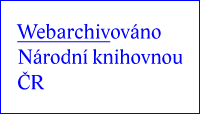Editorial 2024/1
Dear Readers,
We are pleased to present you with the summer issue of Knihovna: knihovnická revue, now with a refreshed graphic design.
The first article in the reviewed section delves into the history of libraries, focusing on a particular phase in the development of the National Library of Technology. It highlights the figure of Spiridion Wukadinović, a Germanist who assumed leadership of the library. This Croatian national from the Austro-Hungarian Empire faced significant challenges in his efforts to modernize the institution. Based on historical research, the article sheds light on the obstacles he encountered.
The second reviewed article brings us back into the present day with an exploration of sustainability and data management in digital collections and archives. It examines the critical issue of long-term energy sustainability in relation to digitization of collection objects and subsequent long-term storage of digitized data. The article also provides valuable insights into environmental reporting, energy sustainability and climate impacts of long-term data preservation efforts.
This year marks the centenary of the Slavonic Library in Prague, part of the National Library of the Czech Republic. A contribution from its director reflects the rich and complex history of this venerable institution. From its founding vision and leadership to the evolution of its collections and services, as well as the challenges it faces today, this article offers a comprehensive overview of the library’s journey.
Another article discusses the Children and New Media 2023 research study, which examines how (and why) children aged 6-15 use and interact with media, utilizing both quantitative and qualitative methodologies. The study explores the rapidly changing media environment for these digital natives, born after 2000 – how leisure time, user preferences or reading are influenced. The analysis focuses on four key areas: leisure, media, education, and mental well-being, always regarding their respective age. Children were divided into different age groups and their changing habits studied, as well as the changes in emotional and cognitive development itself.
A Polish author contributes with an article on the transformation of the Czech literary canon within the Polish cultural context. The literary canon, typically understood as an authoritative collection of works recipients are expected to be familiar with, is often marked as valuable, encyclopaedical, accepted, implemented or national. The canon of any literature (Czech, in this case) originated abroad is by nature specific and thus provides valuable information on the respective environment. This article explores why Czech authors such as Jaroslav Hašek, Bohumil Hrabal, and Karel Čapek are so popular in Poland, and which new Czech authors are being incorporated into such evolving canon.
This issue’s book review highlights Grzegorz Niec’s notable work, Książka, naród, religia: dzieje książki czeskiej do czasów odrodzenia narodowego (Book, Nation, Religion: The History of the Czech Book up to the National Revival), published by Księgarnia Akademicka in Kraków. We eagerly anticipate the second volume, currently in progress.
As always, the Recommended Reading from the Library and Infor¬mation Science Literature Library section offers an overview of the latest publications in our field. In addition, the New Library Science Publications from Abroad section, featuring selections from Knižnica and Bulletin des bibliothèques de France, covers topics ranging from the history of the Cabinet of Retrospective Bibliography at the University Library in Bratislava to informal education and collaborative projects in France.
We are grateful for your continued support. Please allow a gentle reminder on next deadlines for submissions to Knihovna: knihovnická revue (https://knihovnarevue-en.nkp.cz/terms) and Knihovna plus (https://knihovnaplus-en.nkp.cz/).
Wishing you a wonderful summer!
On behalf of the editorial team,
Renáta Krejčí Salátová









